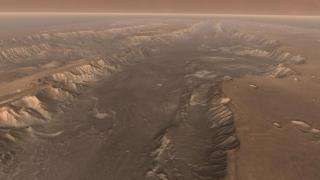Years of Observing Combined Into Best-Yet Look at Mars Canyon

A new view of the biggest canyon in the solar system, merging hundreds of photos from NASA's Mars Odyssey orbiter, offers scientists and the public an online resource for exploring the entire canyon in detail.
This canyon system on Mars, named Valles Marineris, stretches as far as the distance from California to New York. Steep walls nearly as high as Mount Everest give way to numerous side canyons, possibly carved by water. In places, walls have shed massive landslides spilling far out onto the canyon floor.
A simulated fly-through using the newly assembled imagery is available online at www.nasa.gov/mission_pages
/mars/missions/odyssey/20060313.html The fly-through plus tools for wandering across and zooming into the large image are at themis.asu.edu .
"We picked Valles Marineris to make this first mosaic because it's probably the most complex, interesting feature on the entire planet," said Dr. Phil Christensen of Arizona State University, Tempe. He is the principal investigator for Mars Odyssey's versatile camera, the Thermal Emission Imaging System. "To understand many of the processes on Mars -- erosion, landsliding and the effects of water -- you really need to have a big-picture view but still be able to see the details."
Small parts of the canyon have been seen at higher resolution, but at 100 meters (328 feet) per pixel, the new view has sharper resolution than any previous imaging of the entire canyon.
In addition to the completed mosaic of Valles Marineris images, the camera team has also prepared an online data set of nearly the entire planet of Mars at 232 meters (760 feet) per pixel, the most detailed global view of the red planet. The team plans to post 100-meter-resolution mosaics of other regions of Mars in coming months.
Odyssey reached Mars in 2001. The Thermal Emission Imaging System began observing the planet systematically in February 2002 both in visible wavelengths and in infrared wavelengths, which are better for seeing surface details through Mars' atmospheric dust. As the spacecraft passes over an area, the camera records images of swaths 32 kilometers wide (20 miles wide). More than three years of observations made at infrared wavelengths during Martian daytime are combined into the assembled view of Valles Marineris and the global image data set.
Mars Odyssey is managed by NASA's Jet Propulsion Laboratory, a division of the California Institute of Technology, Pasadena, for NASA's Science Mission Directorate, Washington. Lockheed Martin Space Systems, Denver, is the prime contractor for the project and built the spacecraft. The orbiter began an extended mission in August 2004 after successfully completing its primary mission.
Source: NASA















